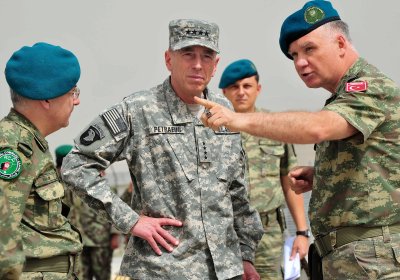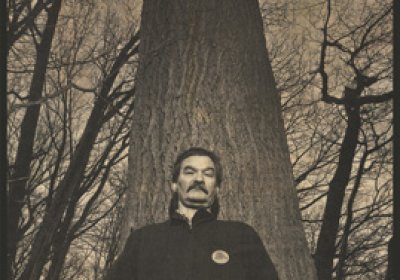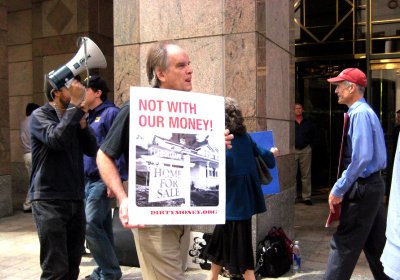The TV anchorwoman was conducting a split screen interview with a journalist who had volunteered to be a witness at the execution of a man on death row in Utah for 25 years.
“He had a choice”, said the journalist, “lethal injection or firing squad”. “Wow!” said the anchorwoman.
Cue a blizzard of commercials for fast food, teeth whitener, stomach stapling, the new Cadillac. This was followed by the war in Afghanistan, presented by a correspondent sweating in a flak jacket.
United States
A Washington DC court convicted a repeat-offender in May for a crime that could have seen him spend years in prison.
The offender was not a BP executive found guilty of criminal negligence over the Gulf of Mexico oil spill. Nor was it any other environmental vandal.
It was climate change activist Ted Glick.
His crime was to hang two banners off the Hart Senate Office Building on Capitol Hill in September last year.
The financial reform legislation just passed by Congress was proclaimed by US President Barack Obama as “the toughest financial reform since the ones we created in the aftermath of the Great Depression”.
This is a kind of doublespeak. The entire thrust of financial reform in the decades since the 1930s has been toward financial deregulation. Being the toughest financial reform measure by that standard merely means that it didn’t give the house away.
When Bolivian foreign minister David Choquehuanca and US assistant Secretary of State Arturo Valenzuela met at the start of June, it appeared that relations between the US and Bolivia were on the verge of being normalised following an 18-month diplomatic chill.
But hope for improved relations appeared to be dashed two weeks later when Bolivian President Evo Morales accused the US government-funded US Agency for International Development (USAID) of financing groups opposed to his government.
How do wars begin? With a “master illusion”, according to Ralph McGehee, one of the CIA’s pioneers in “black propaganda”, known today as “news management”.
In 1983, he described to me how the CIA had faked an “incident” that became the “conclusive proof of North Vietnam’s aggression”.
This followed a claim, also fake, that North Vietnamese torpedo boats had attacked a US warship in the Gulf of Tonkin in August 1964.
On June 1, part-Peruvian US actor and indigenous rights activist Q’orianka Kilcher was arrested for “disorderly conduct” after chaining herself to the White House fence while Peruvian President Alan Garcia met with US President Barack Obama.
Garcia refers to the Amazonian indigenous peoples of his country as barbaric savages. Kilcher had doused her body in black paint, symbolic of the oil killing the Amazon and its people.
On June 20, US group Act Now to Stop War and Racism (ANSWER) released a statement, abridged below, on the blockade of the docks in Oakland that prevented an Israeli ship unloading its goods as part of the global boycott, divestment and sanctions campaign targetting apartheid Israel.
* * *
British Petroleum (BP) has admitted it may not stop the Deepwater Horizon oil spill in the Gulf of Mexico until August — at the earliest. But despite the catastrophe, the US government’s Minerals Management Service (MMS) has given BP new leases for deepwater drilling.
The MMS has rubber-stamped 198 new deepwater drilling leases in the gulf since the BP spill began on April 20. It awarded BP 13 of these.
The US's worst-ever environmental disaster took yet another bad turn after British Petroleum's (BP) latest efforts to stop the torrent of oil from the Deepwater Horizon well failed.
Public discontent is growing, with increasing calls for a government takeover of the operation and seizure of BP’s assets.
The Deepwater Horizon oilrig exploded on April 20, killing 11 workers and releasing between 19.7 million and 43 million gallons of oil into the Gulf of Mexico.
In April, Arizona passed SB 1070, a controversial law that encourages police officers to harass residents they "reasonably suspect" to be undocumented migrants. Chuck D, from hip-hop legends Public Enemy, spoke to sports journalist, broadcaster and author Dave Zirin about SB 1070. Abridged from Zirin’s website, Edge of Sports .
* * *
DZ: Why did you choose to record “Tear Down this Wall?”
At the G20 Economic Forum in Pittsburgh in September, President Barack Obama said his administration would combat climate change by phasing out the US government’s grandiose subsidies to the fossil fuel industry.
But a report released on April 13 by Synapse Energy Economics (SEE) said Obama hadn’t followed through on his promise to cut dirty energy handouts.
“Break the war alliance” is one of the key messages anti-war groups will send to US President Barack Obama when he visits Australia in June.
Protesters plan to focus on the stepped-up US war drive in Afghanistan and Pakistan. They will also demand of Obama and Prime Minister Kevin Rudd that the occupying troops leave.
Compared to the Bush administration, total US defence spending is projected to rise from US$534.5 billion in 2006 to $663.7 billion in 2010 according to Congressional budget papers.
- Previous page
- Page 131
- Next page











